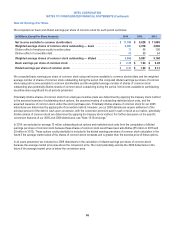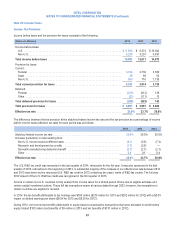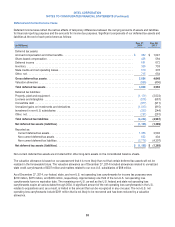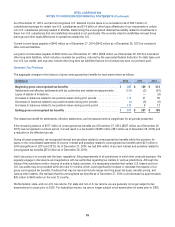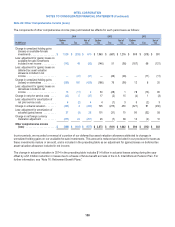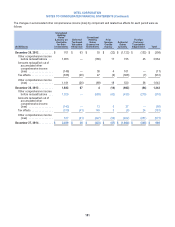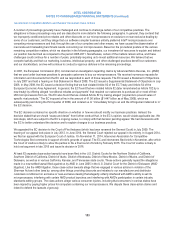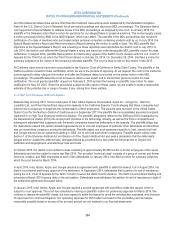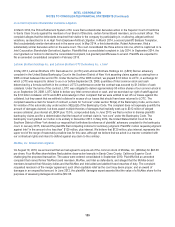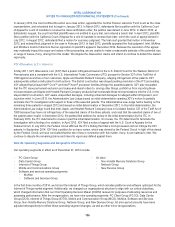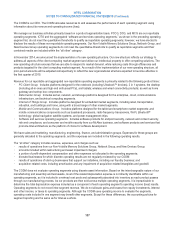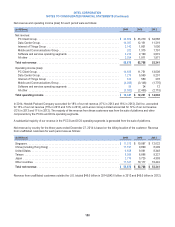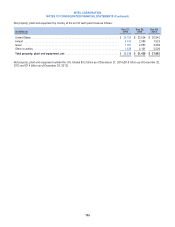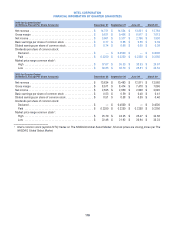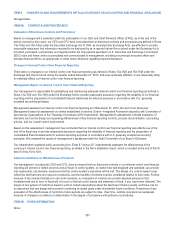Intel 2014 Annual Report Download - page 111
Download and view the complete annual report
Please find page 111 of the 2014 Intel annual report below. You can navigate through the pages in the report by either clicking on the pages listed below, or by using the keyword search tool below to find specific information within the annual report.INTEL CORPORATION
NOTES TO CONSOLIDATED FINANCIAL STATEMENTS (Continued)
In January 2012, the court certified the action as a class action, appointed the Central Pension Laborers’ Fund to act as the class
representative, and scheduled trial to begin in January 2013. In March 2012, defendants filed a petition with the California Court
of Appeal for a writ of mandate to reverse the class certification order; the petition was denied in June 2012. In March 2012, at
defendants’ request, the court held that plaintiffs were not entitled to a jury trial, and ordered a bench trial. In April 2012, plaintiffs
filed a petition with the California Court of Appeal for a writ of mandate to reverse that order, which the court of appeal denied in
July 2012. In August 2012, defendants filed a motion for summary judgment. The trial court granted that motion in November
2012, and entered final judgment in the case in February 2013. In April 2013, plaintiffs appealed the final judgment. Intel, McAfee,
and McAfee’s board of directors filed an opposition to plaintiff’s appeal in December 2014. Because the resolution of the appeal
may materially impact the scope and nature of the proceeding, we are unable to make a reasonable estimate of the potential loss
or range of losses, if any, arising from this matter. We dispute the class-action claims and intend to continue to defend the lawsuit
vigorously.
X2Y Attenuators, LLC v. Intel et al
In May 2011, X2Y Attenuators, LLC (X2Y) filed a patent infringement lawsuit in the U.S. District Court for the Western District of
Pennsylvania and a complaint with the U.S. International Trade Commission (ITC) pursuant to Section 337 of the Tariff Act of
1930 against us and two of our customers, Apple and Hewlett-Packard Company, alleging infringement of five patents. X2Y
subsequently added a sixth patent to both actions. The district court action was stayed pending resolution of the ITC proceeding.
X2Y alleged that at least Intel
®
Core™ and Intel
®
Xeon
®
processor families infringe the asserted patents. X2Y also requested
that the ITC issue permanent exclusion and cease-and-desist orders to, among other things, prohibit us from importing these
microprocessors and Apple and Hewlett-Packard Company products that incorporate these microprocessors into the U.S. In the
stayed district court action, X2Y seeks unspecified damages, including enhanced damages for alleged willful infringement, and
injunctive relief. In June 2012, the Administrative Law Judge issued an initial determination granting X2Y’s motion to partially
terminate the ITC investigation with respect to three of the asserted patents. The Administrative Law Judge held a hearing on the
remaining three patents in August 2012 and issued an initial determination in December 2012. In the initial determination, the
Administrative Law Judge found that Intel, Apple, and Hewlett-Packard Company have not violated Section 337 of the Tariff Act of
1930 because they have not infringed any of the asserted claims of the three patents, and ruled that the asserted claims of two of
the patents were invalid. In December 2012, the parties filed petitions for review of the initial determination by the ITC. In
February 2013, the ITC determined to review in part the initial determination. On review, the ITC determined to terminate the
investigation with a finding of no violation. In April 2013, X2Y filed a notice of appeal with the U.S. Court of Appeals for the
Federal Circuit. In July 2014, the Federal Circuit affirmed the ITC’s finding that Intel’s microprocessors did not infringe the X2Y
patents. In September 2014, X2Y filed a petition for en banc review, which was denied by the Federal Circuit. In light of this denial
by the Federal Circuit, we have concluded that the risk of loss in connection with this matter, if any, is not material to Intel. We
continue to dispute the remaining claims and intend to vigorously defend against them.
Note 26: Operating Segments and Geographic Information
Our operating segments in effect as of December 27, 2014 include:
•PC Client Group •All other
•Data Center Group •Non-Volatile Memory Solutions Group
•Internet of Things Group •Netbook Group
•Mobile and Communications Group •New Devices Group
•Software and services operating segments
•McAfee
•Software and Services Group
In the first three months of 2014, we formed the Internet of Things Group, which includes platforms and software optimized for the
Internet of Things market segment. Additionally, we changed our organizational structure to align with our critical objectives,
which changed information that our Chief Operating Decision Maker (CODM) reviews for purposes of allocating resources and
assessing performance. After the reorganization, we have nine operating segments: PC Client Group (PCCG), Data Center
Group (DCG), Internet of Things Group (IOTG), Mobile and Communication Group (MCG), McAfee, Software and Services
Group, Non-Volatile Memory Solutions Group, Netbook Group, and New Devices Group. All prior-period amounts have been
adjusted retrospectively to reflect these operating segment changes, as well as other minor reorganizations.
106


